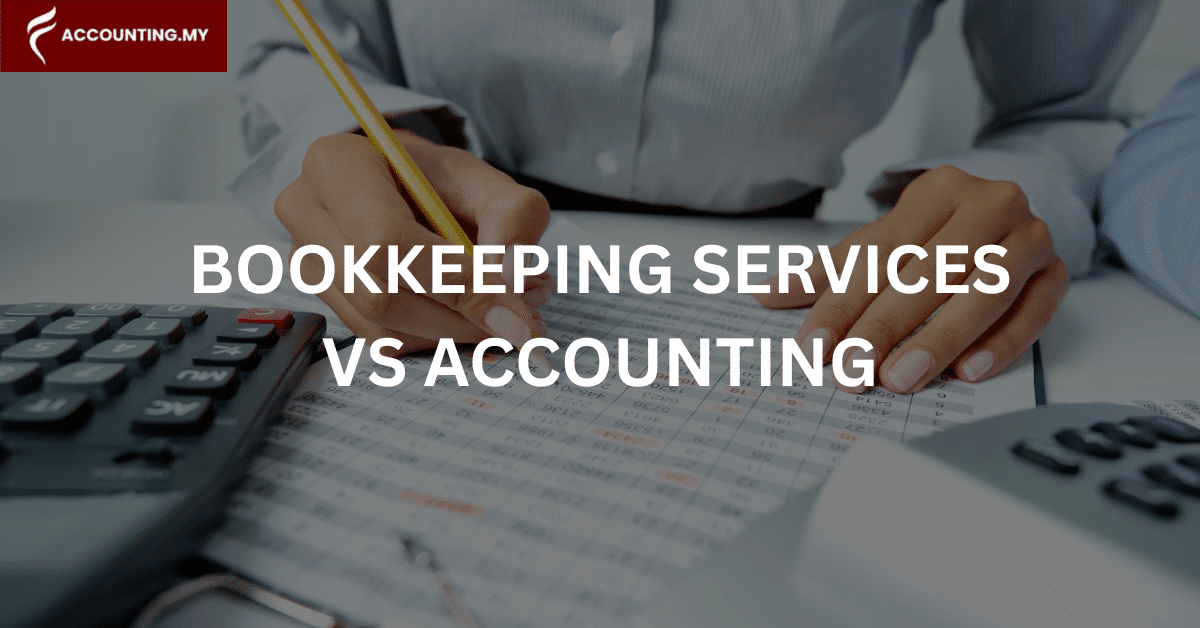
- Accounting.my
- April 29, 2025
- 2:24 am

What's the Difference: Bookkeeping Services vs Accounting?
Running a business can feel like navigating a complex tunnel, right? You’ve got your vision, your customers, and the daily grind. But without a clear picture of your finances, you’re essentially moving in the dark.
Table of Contents
ToggleThat’s where bookkeeping services come in, they act as your financial headlights, illuminating the path and ensuring you don’t veer off course. They provide that clear view of your business’s financial health, allowing you to make better decisions with better data.
What is Bookkeeping Meaning?
At its core, bookkeeping is the systematic recording of every financial transaction your business makes. This includes sales, purchases, expenses, and payments. The idea is to track every monetary movement accurately and make sure nothing gets left behind.
Now, you might wonder, “Can’t I just use an excel spreadsheet?” And yes, for very small-scale operations, that might do the trick.
But as your business expands, bringing with it more transactions, complex supply chains, and greater financial activity, things get complicated real fast.
Difference Between Bookkeeping vs. Accounting
It’s common to hear bookkeeping and accounting used interchangeably, but they are not the same. Bookkeeping is the foundation, while accounting builds upon it. Here is a nifty table to showcase their differences.
Area | Bookkeeping | Accounting |
Focus | Daily recording of financial transactions | Analysis and interpretation of financial data |
Tasks | Data entry, invoicing, bank reconciliation | Financial statement preparation, audits, advice |
Primary Goal | Maintaining accurate financial records | Providing insights and strategic recommendations |
Nature | Procedural and transactional | Analytical and strategic |
Level of Detail | Detailed record of individual transactions | Summarized and interpreted financial information |
Timeframe | Ongoing, day-to-day | Periodic (monthly, quarterly, annually) |
Skill Level | Requires attention to detail and accuracy | Requires financial expertise and analytical skills |
Outcome | Organized and accurate financial data | Financial reports, insights, and strategic advice |
What Are The Benefits of Bookkeeping?
Beyond keeping records and tracking your day-to-day expenditure and operations, they are more tangible benefits to bookkeeping than just financial tracking.
Accurate Financial Reporting
With proper bookkeeping, you can generate accurate financial statements like balance sheets and profit and loss reports. These reports are important for making informed business decisions, such as whether to invest in new equipment or expanding your operations.
In addition, a clear financial history helps in obtaining loans or even attracting investors since they would like to see a trustworthy financial history before committing their capital.
Effective Cash Flow Management
Cash flow is the lifeblood of any business, especially small ones. Bookkeeping helps you track the movement of money in and out of your business, allowing you to anticipate potential cash shortages or surpluses.
Knowing precisely where your money is going and where it’s coming from allows you to make strategic adjustments, cut unnecessary expenses, and perhaps even identify new revenue streams.
Tax Compliance
Bookkeeping isn’t just about ticking boxes, writing down ledgers, it’s also about staying on the right side of the taxman. Proper bookkeeping makes certain you’ve got all the paperwork you need to back up your filings. This means fewer worries about penalties or those dreaded audits since you already done all of your paperwork.
And here’s a neat little bonus: good records can actually save you some cash. By keeping track of everything, you can spot those tax relief and deductions you’re entitled to that LHDN would generously gives you.
Performance Analysis
Bookkeeping provides valuable insights into your business’s performance. By analyzing your financial data, you can identify trends, measure profitability, and track key performance indicators (KPIs).
This allows you to make smarter business decisions that you may not have thought of.
Prevention of Financial Instability and Legal Issues
Poor bookkeeping can lead to serious financial problems, including inaccurate financial statements, missed income tax deadline, and even legal issues.
By maintaining accurate and up-to-date records, you can avoid these pitfalls and ensure the long-term stability and success of your business. Without proper bookkeeping, you may not be able to detect fraud, or errors that could be costly.
When to Consider Bookkeeping Services
Knowing when to engage professional bookkeeping services is key. If you’re spending too much time on paperwork, struggling to keep up with financial records, or facing tax compliance issues, it’s a sign you may need help.
When choosing a service, consider these factors:
- Industry Expertise: Do they understand the specific financial nuances of your industry?
- Service Range: Beyond basic data entry, what other services do they offer ( payroll, financial statements, analysis)? Can they meet your evolving needs?
- Reputation: What do online reviews and references say about their accuracy, reliability, and professionalism?
- Technology Integration: Do they utilize modern accounting software, cloud solutions, and automation for efficiency?
- Communication & Accessibility: Will you have a dedicated contact? Are they responsive and easy to communicate with?
- Pricing & Scalability: Does their pricing align with your current needs and budget? How will costs change as your business grows?
Conclusion on Bookkeeping Services vs Accounting Services
Bookkeeping services are fundamentally about keeping a detailed and up-to-date record of all your business’s financial comings and goings. It’s the regular task of noting down every transaction, from sales to expenses.
Accounting, however, takes a broader view. It uses the records created by bookkeeping to analyse your business’s financial situation. Accountants prepare reports, offer insights into your financial health, and guide you in making informed business decisions.
At Accounting.my, we see these as two sides of the same coin – solid bookkeeping provides the raw information, and skilled accounting turns that information into valuable knowledge to help your business thrive.
We offer a full range of accounting services, including bookkeeping, payroll, tax filing, audits, financial reporting, and even financial analysis to help you make the best decisions for your business using advanced accounting software and our 13+ years of expertise.
Allow the experts like us to help handle the day-to-day operations of your business while you focus on the matters that mean the most for your business.
Frequently Asked Questions About Bookkeeping Services
Yes. Many bookkeeping services can manage your invoicing process, including creating, sending, and tracking invoices to ensure timely payments from your customers.
Reputable bookkeeping service providers typically have measures in place to ensure continuity, such as team-based approaches or assigning another qualified bookkeeper to your account.
Yes. Bookkeeping services can often assist with processing and recording employee expense claims and reimbursements, ensuring they are properly documented and accounted for.
Absolutely. By accurately recording income and expenses, bookkeeping provides the fundamental data necessary for generating profit and loss statements, which clearly show your business's profitability over a specific period.
Yes. Maintaining accurate and organised records through bookkeeping services is crucial for audit preparedness and can facilitate a smoother audit process by the LHDN.
Yes. Digital services provided by foreign service providers to Malaysian consumers are subject to service tax, and these providers must register if they meet the threshold.
Popular Post


How to Apply for a Food Handling Certificate in Malaysia

Best 10 KSL Hair Salon: Where All Locals & Singaporeans Go

Enterprise vs Sdn Bhd: What Malaysian Owners Must Know

Sick Leave in Malaysia: Rules, Rights & HR Guide

Contract of Service vs Contract for Service in Malaysia Explained

Malaysia first AI bank – Ryt Bank Launches 18 August 2025

We Offer FREE HRDF Claimable E-Invoice Training (If You Contribute)

Best 10 SEO agency in Malaysia


